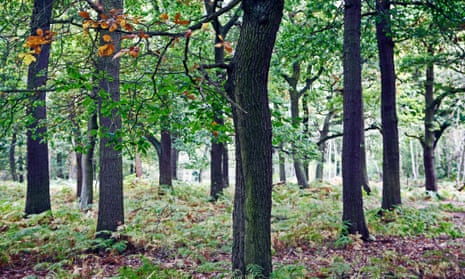Scientists have already calculated how many fish there are in the sea (230,000 species), and how many species there are on the planet overall (8.7m). Now they have had a crack at counting all of the world’s trees.
Using a combination of satellite and ground measurements, researchers estimated that there are just over 3tn trees on the planet, over seven times as many as the current, non peer-reviewed reckoning that relied on satellite images alone.
But people are having an “overwhelming” impact on the world’s forests, according to the international team from 15 countries. Human activities have led to the loss of nearly half the world’s trees (45.8%), the study found.
Today, people are responsible for the loss of around 15bn trees a year due to deforestation and demand for farmland, a figure that the authors said was “considerably higher” than just a century ago.
“The scale of the human impact [we found] was astronomical. The number of trees cut down is almost 3tn since the start of civilisation,” said Thomas Crowther of Yale University, the lead author of the study, published in the journal Nature on Wednesday.
“I didn’t expect human activity to come out as the strongest control on tree density across all of the biomes [habitat types]. It was one of the dominant regulators of the number of trees in almost all of the world. It really highlights how big an impact humans are having on the Earth at a global scale,” he said.
The study was prompted by calls from tree-planting initiatives for a clearer picture of tree-number baselines, so that they could better understand the impact of projects such as the Billion Trees Campaign. Crowther said that the fact there were many more trees than previously thought did not undermine the merit of such efforts.
“The message remains that a billion trees is still a huge contribution,” he said . “I was concerned that providing them [such tree-planting efforts] with this final information might deter efforts and make people go ‘okay, planting a million trees is pointless’ but actually we got the opposite response.” He said such projects were now looking to plant a trillion trees rather than a billion.
The densest areas for trees were found in the northern boreal forests of Canada, China and Russia, though the authors said the latter two were some of the sparsest parts of the world for data on the ground. Tropical and subtropical forests hold most of the world’s trees, with around 1.39tn in total, while heavily human-impacted temperate regions such as Europe and Asia had just 0.61tn.
The earlier estimate of 400bn trees in the world, or 61 per person, was based on satellite imagery and published in a 2009 book rather than in a scientific journal. The new study combines satellite data with more than 400,000 ground-based measurements from sources including government’s forest inventories and other studies.
Dr Simon Lewis, a geographer at the University College London and University of Leeds, said the new work was important but did not show there was more trees than previously thought because the earlier estimate had not been peer-reviewed.
“To me it is more the first robust estimate of the number of trees. It’s an important and useful piece of work but we should remember that the number of trees is not necessarily the best metric for measuring the health of an ecosystem or its importance. A plantation of many of the same trees isn’t the same as a patch of Amazon rainforest.”
He said that the study did not change our understanding of the role that forests played in slowing manmade climate change because the amount of carbon the world’s trees can store is already well-studied. But he said such global overviews helped “us to see the world in a different way” and the loss of 45.8% of trees since the post-Pleistocene period was “very striking”.
The gross loss of trees was around 15.3bn trees each year, but the net loss is likely closer to around 10bn a year because of the growth of around 5bn trees a year, the authors said.
The study counted trees that were 10cm in diameter, the only universally-used standard, meaning there are likely billions more smaller trees that remain uncounted.

Comments (…)
Sign in or create your Guardian account to join the discussion